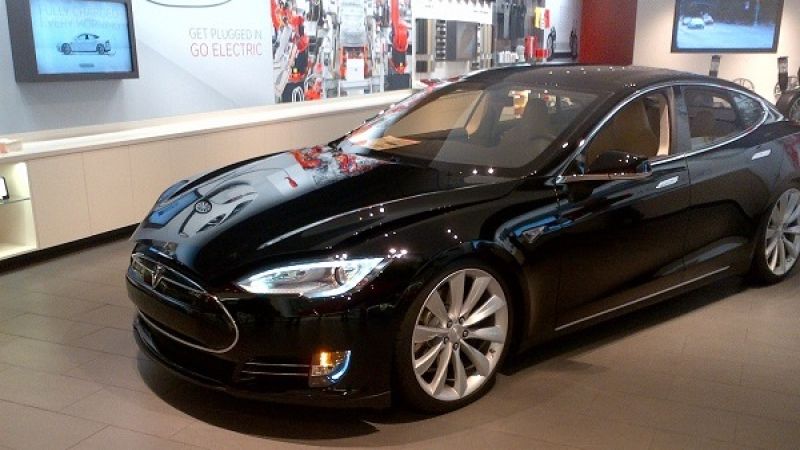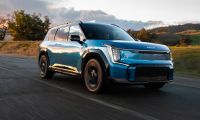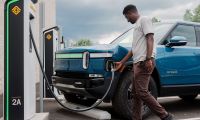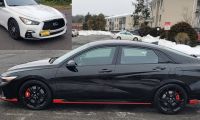Tesla owners and fans may not like it, but when an automaker makes changes to a vehicle already in owners’ hands for safety reasons it is called a “recall.” That the cars can be repaired by the company remotely or by mail makes no difference to NHTSA. Tesla deserves major kudos for being proactive, but despite having already taken action, Jennifer Timian, Chief of the Recall Division at NHTSA, issued recall notice 14V006000 to Tesla on January 13th, 2014. The recall topic is potential overheating and fire risks associated with Tesla Model S cars while charging using the Universal Mobile Connector (UMC). Today Tesla sent a press release to its fans and customers in which it calls the word recall "outdated." The release contained a link to the explanation about the recall.
In its response to the “voluntary” recall, James Chen of Tesla acknowledges that in late 2012 Tesla received some UMCs that showed internal damage and had stopped charging. Tesla says that it received back about 3% of the chargers showing this damage. Tesla says that the damage was contained and that the power was stopped between the UMC and its NEMA 14-50 adapter. Mr. Chen says in his letter acknowledging the recall that in addition to those damaged UMCs, in late 2013 Tesla “became aware of several events that resulted in thermal damage external to the UMC.” Translation for this sentence might be that there was melting or other type of heat related damage to property where the Tesla was charging. The letter also acknowledges the garage fire that occurred in Irvine California while a Tesla was charging.
Tesla maintains that the causes of these incidents is “The building receptacle or wiring.” In other words, the reason that there have been some melted parts in 2012, several heat damaged UMCs in 2013, and at least one fire is that the homeowners’ wiring or components are not up to snuff. In order to help make the system more foolproof Tesla has taken at least two steps.
The first step was to update the software in the Model S to reduce the current draw if the car’s charging system senses any problems. The second step is to replace the UMC’s NEMA 14-50 adapter with one that has an added internal heat sensitive circuit interrupter (fuse). Tesla has already sent the software update. As part of the recall it will follow up to ensure that the update has been installed by customers.
Unrelated to this is the prior software update that changed the highway ride height in Model S cars that had the adjustable suspension option. That change was to prevent the Model S from striking road debris. 2 fires are reported to have happened due to Model S cars hitting metal objects on the highway and then having their battery packs catch fire. No injuries were reported in either event.
Tesla owners vehemently defend their cars and Tesla in general when any talk of recalls or fires comes up. Tesla fans point to the many internal combustion engine equipped car fires that happen each year. Tesla owners claim that the media overlooks ICE vehicle fires. That may be true in general, but it is not true at Torque News. In fairness to the ICE cars, they are always recalled when such events are discovered. The recalls are often reported here and in the wider automotive media. The Ford Escape had multiple fire related recalls upon launch last year and the popular Chevy Silverado was just this week recalled for fire related issues.
Photo Credits - Main story photo of a Tesla not on fire by the author. Our thanks to Tesla Model S owner Michael L, who provided the photos of the UMC and adapter. These were the replacement parts given to him on Wednesday January 15th during an annual service visit to his Tesla Service Center. They are NOT the new parts. The owner asked if they were and was told they are not yet available.
Set as google preferred source












Comments
I appreciate the tactfulness
Permalink
I appreciate the tactfulness of your article, but you say "when an automaker makes changes to a vehicle already in owners’ hands for safety reasons", this is not a change to the "vehicle". This is only an adapter that you stick on the end of the charging cord when you choose to plug it into a 240v outlet. There are various adapters for different types of outlets. This new adapter contains a thermal fuse to cut off the power in the event that your 240v outlet has inadequate or faulty wiring which may cause the outlet to overheat and start a garage fire. The adapter is not part of the car. It is merely an accessory. The over-the-air software update monitors the flow of current and if it detects any variations, it will scale back the rate of charging 25%. Just as Elon Musk said, the word "recall" is not applicable here.
So complain to NHTSA. In
Permalink
In reply to I appreciate the tactfulness by Christopher Griffin (not verified)
So complain to NHTSA. In this particular case the story is factual and not based on my views or opinions. I completely agree with you that a better term could be used by NHTSA. how about "Safety Notice?" You might take a look around the web at the other stories about Tesla and its recall and note the number of photos atop those stories with a Tesla in flames. I think I did a pretty good job of pointing out the facts.
Your article is misleading.
Permalink
Your article is misleading. You're talking about the replacement of a part that isn't even part of the car, and the NTSHA did not require it.
If you're so concerned about fires, then you ought to be concerned about your portfolio, because I can smell a burning short.
I'm not concerned at all
Permalink
In reply to Your article is misleading. by GoodReason (not verified)
I never said in the article that NHTSA required Tesla to do anything. You drew that conclusion. In fact, in the subtitle I say "Despite already taking action Tesla ..." In the recall notice under "remedy" replacing the connector is indeed part of what is actually happening. Here is the NHTSA recall notice if you want to cut and paste it into your browser.. - -
http://www-odi.nhtsa.dot.gov/owners/SearchResults?searchType=ID&targetCategory=R&searchCriteria.nhtsa_ids=14V006000
While the information in the
Permalink
While the information in the article is correct, your title is ABSOLUTELY misleading. I don't want to attack your character as I do not personally know you, but this is the kind of journalism that is looking for reads and uses misleading titles. They are not recalling the 2013 Model S in any form. They are issuing a FORMAL recall for the charging adapter, which Tesla has already sent out replacements for. I don't mean to be a troll but honestly the journalism surrounding Tesla is sensationalist and the only reason I clicked it is probably the reason you titled it the way you did.
You are not correct. Read
Permalink
You are not correct. Read the recall notice at the link provided above. The recall does cover the car. You are focusing on only one part of the recall, the connector. The software update, which changes the actual car, is part of the recall and you are ignoring that. Here is the exact title of the recall from the NHTSA website: Tesla Motors, Inc. (Tesla) is recalling certain model year 2013 Model S vehicles equipped for, and delivered with, certain NEMA 14-50 (240 volt) Universal Mobile Connector (UMC) adapters. During charging, the adapter, cord, or wall outlet could overheat. - - Here is the Remedy part of the recall notice: Tesla will notify owners and provide an "over-the-air" software update. Some owners have already received this update. This update allows the Model S on board charging system to detect any unexpected fluctuations in the input power or higher resistance connections to the vehicle. If detected, the onboard charging system will automatically reduce the charging current by 25%. Tesla owners can verify that they have received the updated software (version 5.8.4 or later) by viewing the vehicle's center information screen. Additionally, Tesla will mail owners a replacement NEMA 14-50 adapter that is equipped with an internal thermal fuse. The manufacturer has not yet provided a notification schedule. Owners may contact Tesla Service Center at 1-877-79-TESLA (1-877-798-3752).
Tesla has issued several over
Permalink
In reply to You are not correct. Read by John Goreham
Tesla has issued several over-the-air software updates on the Model S since mid 2012. Are you saying that every time a new software update is issued, they are all recalls?!
I am not. NHTSA is saying
Permalink
In reply to Tesla has issued several over by Christopher Griffin (not verified)
I am not. NHTSA is saying that in this case it is. Again, complain to NHTSA. I didn't make this up or decide to issue the recall. I reported the event factually. I'm starting to assume you are kidding.
I was not ignoring the recall
Permalink
In reply to You are not correct. Read by John Goreham
I was not ignoring the recall, nor any part of it. But the word "recall" insinuates a physical retrieval of all 29,000+ vehicles involved in this story. The cars are in question, yes, but only so far as they came with a supposedly "faulty" piece of equipment, to which Tesla proactively issued a software update, and sent out new NEMA 14-50 adapters. When someone reads recall, they immediately go back to the picture in their head of a Model S sitting on the side of the road engulfed in flames. Faulty wiring combined with boxes stacked oh-so-carefully near a charging port caused the fire. I don't personally think the "recall" word should have even been used because it was an isolated incident (yes I'm aware of some first gen issues but I'm sure the iPad didn't release without a few problems) and it was solved with a software update and a new plug.
Also, the software update does not change the actual car, it changes the fail-safes on charging the vehicle, hence the term "software". You're more likely to have a PS4 light your house on fire than a car with more technology than most consumers know.
You and I agree for the most
Permalink
In reply to I was not ignoring the recall by That One Guy (not verified)
You and I agree for the most part and I do appreciate your comments. For the record, I didn't put that image in your head of the car in flames. I have never shown a photo of a Tesla on fire as relates to this issue (possible charging fires). The car on fire photos you mentioned relate to the other Tesla fire issue. NHTSA did issue a recall this week on the Model S. This is the Tesla's Model S' second. In the first one last June the affected cars did have to go to the service centers. (http://www.torquenews.com/1081/tesla-recalls-model-s-first-time-promises-owners-luxurious-treatment) I can sympathize with fans of the car, but parts of the charging system melted and failed in addition to the fire event. If you think this could have been managed better your ire is really better directed at the agency that issued the recall, the electrical contractors that did not properly wire the home, and the automaker that shipped parts that failed in the field.
Do the Tesla technical
Permalink
Do the Tesla technical support people inspect the homes before the installation of the charging cord, like Nissan does?
EXCELLENT point. I do not
Permalink
In reply to Do the Tesla technical by George Voll (not verified)
EXCELLENT point. I do not believe that they do. Do you have more information about the Nissan procedure? Do they just inspect the cable to the connector, or do they look at the home's wiring? I assume they don't, but this is news to me. Please tell us more if you can.
Tesla doesn't actually
Permalink
In reply to EXCELLENT point. I do not by John Goreham
Tesla doesn't actually install any of the equipment; they more than likely have preferred vendors in the area but they are not actually affiliated with Tesla. More often than not, Tesla owners have someone they know to come out and do the labor (either personally or professionally) but that's why this story irks me so much. I don't mean for anything to be directed at you, John, I'm just doing this for the sake of having an intelligible conversation, which are few and far between behind the guise of the internet. Btw, I'm Robert, not That One Guy...obviously haha.
Thank you Robert. I value
Permalink
Thank you Robert. I value your input. I am very active on the Tesla Clubs and forums. The two most active topics for discussion on the FB Tesla club I like most are: "Did you pull a building permit and have your charger wiring inspected?" and one I posted "Have you received your replacement connector yet?" These are just open discussions, not replies to any particular published story. Both are very active with the dialogue filling multiple screens, people adding links, photos, personal stores etc. Many owners of Model S cars are discussing their melted and or failed connectors, failed charging systems, and worrisome ones that are hot to the touch. There is real concern. Other have none of these issues and offer their wiring stories to see if there is a trend. The post about having the work inspected is very revealing. There is concern there by some. Many did have the work inspected and many had Solar City do their wiring when they got solar. Among owners I see discussing this it is not a meaningless topic, but one they are very much interested in sorting out. I hope you keep posting your thoughts. If you look at the Torque News Tesla page you will see we cover every angle with multiple reporters and we don't just throw in a quick headline grabber once in a while like the lamestream media do. More importantly, we have been doing it for literally years.
Our thanks to Tesla Model S
Permalink
Our thanks to Tesla Model S owner Michael L, who provided the photos of the UMC and adapter. These were the replacement parts given to him on Wednesday January 15th during an annual service visit to his Tesla Service Center.
The link you provide says
Permalink
The link you provide says (cut and paste) RECALL Subject : Plug in vehicle charger/Possible fire. This is the vehicle charger, not the vehicle as your title indicates. Complaints need not be directed to NHSTA, they should be directed elsewhere.
E, I am not sure what you
Permalink
In reply to The link you provide says by E (not verified)
E, I am not sure what you mean. Here is the NHTSA Recall cut directly from their filing::
Manufacturer: Tesla Motors, Inc.
SUMMARY:
Tesla Motors, Inc. (Tesla) is recalling certain model year 2013 Model S vehicles equipped for, and delivered with, certain NEMA 14-50 (240 volt) Universal Mobile Connector (UMC) adapters. During charging, the adapter, cord, or wall outlet could overheat.
Under the heading "All
Permalink
Under the heading "All products associated with this recall" NHTSA lists::
Vehicle MakeModelModel Year(s)
TESLAMODEL S2013
This is from Tesla's
Permalink
This is from Tesla's acknowledgement of the recall. In it, Tesla confirms the recall is for the car, as all recalls are. Written by Tesla's Mr. Chen:
"Problem Description:
Tesla Motors, Inc. (Tesla) is recalling certain model year 2013 Model S vehicles equipped for, and delivered with, certain NEMA
14-50 (240 volt) Universal Mobile Connector (UMC) adapters. During charging, the adapter, cord, or wall outlet could overheat."